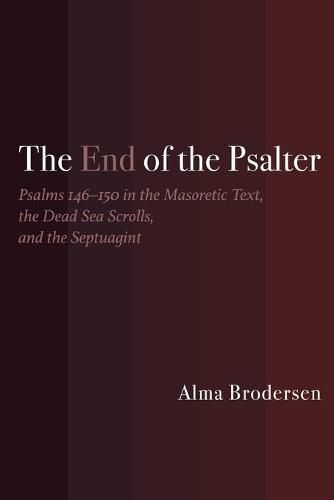Readings Newsletter
Become a Readings Member to make your shopping experience even easier.
Sign in or sign up for free!
You’re not far away from qualifying for FREE standard shipping within Australia
You’ve qualified for FREE standard shipping within Australia
The cart is loading…






This title is printed to order. This book may have been self-published. If so, we cannot guarantee the quality of the content. In the main most books will have gone through the editing process however some may not. We therefore suggest that you be aware of this before ordering this book. If in doubt check either the author or publisher’s details as we are unable to accept any returns unless they are faulty. Please contact us if you have any questions.
Psalms 146a150asometimes called the Final Hallel aare often thought to comprise an end to the Psalter. Frequently seen as connected to other psalms through catchwords that act as both literary and theological links, these final psalms are thought to originally, and deliberately, close out the entire book of psalms. However, Alma Brodersen questions this purported function of these psalms. The End of the Psalter presents new interpretations of Psalms 146a150 based on the oldest extant evidence: the Hebrew Masoretic Text, the Hebrew Dead Sea Scrolls, and the Greek Septuagint. Brodersen analyzes each psalm separately in all three sources, complete with a translation and detailed comments on form, intertextuality, content, genre, and date. Based on this rigorous analysis, Brodersen makes detailed comparisons of the individual psalms and their intertextual references that highlight substantial differences between the transmitted texts. Brodersen concludes that Psalms 146a150 were separate texts, which only came to form the end of the Psalter in the Masoretic tradition. Her work underscores the importance of psalms exegesis before Psalter exegesis, and illustrates how the use of ancient sources furthers the understanding of the Psalms.
$9.00 standard shipping within Australia
FREE standard shipping within Australia for orders over $100.00
Express & International shipping calculated at checkout
This title is printed to order. This book may have been self-published. If so, we cannot guarantee the quality of the content. In the main most books will have gone through the editing process however some may not. We therefore suggest that you be aware of this before ordering this book. If in doubt check either the author or publisher’s details as we are unable to accept any returns unless they are faulty. Please contact us if you have any questions.
Psalms 146a150asometimes called the Final Hallel aare often thought to comprise an end to the Psalter. Frequently seen as connected to other psalms through catchwords that act as both literary and theological links, these final psalms are thought to originally, and deliberately, close out the entire book of psalms. However, Alma Brodersen questions this purported function of these psalms. The End of the Psalter presents new interpretations of Psalms 146a150 based on the oldest extant evidence: the Hebrew Masoretic Text, the Hebrew Dead Sea Scrolls, and the Greek Septuagint. Brodersen analyzes each psalm separately in all three sources, complete with a translation and detailed comments on form, intertextuality, content, genre, and date. Based on this rigorous analysis, Brodersen makes detailed comparisons of the individual psalms and their intertextual references that highlight substantial differences between the transmitted texts. Brodersen concludes that Psalms 146a150 were separate texts, which only came to form the end of the Psalter in the Masoretic tradition. Her work underscores the importance of psalms exegesis before Psalter exegesis, and illustrates how the use of ancient sources furthers the understanding of the Psalms.